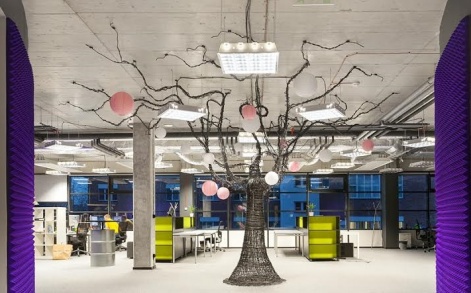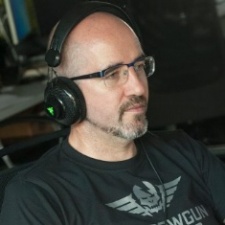It takes a great number of individuals working together in various disciplines to make any commercial enterprise function.
The mobile games industry is certainly no exception, offering dynamic and diverse roles to thousands the world over.
As such, PocketGamer.biz has decided to celebrate this with a regular series of interviews where each week we chat to a mobile games industry professional from a different field - be it game design, art, or PR - to learn about how they bagged that job in games.
Obviously every career path is different, but the goal is to give a picture of the sorts of skills, qualifications and ambition one might need to find themselves in such a role - and how we can all learn from it.
This time, the spotlight is on Michael Boylan, Senior 3D Artist at Unkilled and Shadowgun developer Madfinger Games.
PocketGamer.biz: Tell us a little about your current role and what it entails.
Michael Boylan: My current role is as a character artist at Madfinger Games on Shadowgun Legends.
Legends is a mobile game but due to Madfinger's obsession with quality assets, the character creation process is pretty much the same as on a console or PC title.
The same tools are used throughout the process: ZBrush, Substance painter, Photoshop, 3ds Max, with Unity as the destination game engine.
My typical day would be spent creating human armour and clothing, or alien and robotic enemies.Michael Boylan
In some ways the last stages of production for a mobile platform can be even more demanding, requiring some real old school skills in polygon optimisation and texture authoring.
My typical day would be spent with the above tools creating human armour and clothing, or alien and robotic enemies - keeping things nice and varied!
Madfinger likes each artist to take the character all the way through the pipeline, so you get to own a character pretty much through the whole creation process from a 'ZSphere' to the final in-game asset.
As a senior artist, I also spend some time working as an outsource manager and with the production pipeline.
Madfinger have been been really open to exploring and quickly adopting new techniques and software, more so than any other company I have worked in, which is a real testament to their non-corporate management structure.
How did you first get into this job?
I have had many different jobs in the past, from aircraft cleaner to animator, but when I look back I think I could always see myself gradually moving into a creative field of some description.
I have spent a lot of time in my creative career as an animator - both old school, hand-drawn animation and computer animation - and I just sort of fell into character modelling more than 10 years ago.
I was employed as an animator in a games company and at one point in production they were short on character artists.
They knew I could model in Max and Maya so they asked if I could help out. They liked what I did, so I was just organically moved into that role focusing on characters more and more.
Soon after that I was offered a lead character artist position, and have worked in various roles within the character creation field ever since.
Is it something you ever imagined yourself doing?
Games are the perfect medium for me as game creation marries the disciplines of creativity and technology - my two greatest passions.
15 years ago I never imagined I would be happily making games at Madfinger in the Czech Republic.Michael Boylan
But at the time when I was leaving school, there were no games courses anywhere, and pre-mass internet adoption it was just much more difficult to find information on how to progress in a career in games.
So I never considered it a real possibility in my youth.
These days, though, you have access to all the knowledge you require, from learning portals to direct access to specialist recruitment companies.
So in that way things are much easier now, but I also believe this easy information access has made it a much more competitive industry to break into than it used to be 10 to 15 years ago.
15 years ago I certainly never imagined I would be happily making games at Madfinger in the Czech Republic. Very few jobs offer the kind of opportunities that can be found within the games industry.
What did you study (if anything) to get your role? What courses would you advise for aspiring professionals in the area?
When leaving school, I first did a foundation in fine art, really as a means to getting a portfolio together to apply for an animation course.
I got the place studying animation, and after completing my college education I worked in the hand-drawn animation industry for many years.
In time, I saw the large scale adoption of computer animation and decided I wanted to break in to this field.
I did a short, eight-month course in games development, and after completing this course I applied for three jobs. To my surprise, I was offered all three positions.
There are so many amazing online options for learning these days, but for my mind nothing can substitute the experience gained with working with other people with similar passions.

It's the quickest way to learn, and also teaches the softer interpersonal skills that are indispensable in a game's development team.
For this reason, I think a good college course is a great option to consider.
I can't really recommend anywhere in particular, as I'm long out of the college loop these days, but when applying I would try and find out as much as possible about the tutors' background to get a feel for their knowledge base.
Hopefully, that should give you some idea as to the quality of the course.
Is there anything about the job/industry you wish you would have known when first joining?
I think the transient nature of the business is important to consider, as it's highly likely you will be travelling for work at some time during your career.
Being in the games industry opens up amazing travel possibilities.Michael Boylan
Now I have a family, this is more of a consideration than in my younger days. Not to say traveling is necessarily a bad thing, but it should be considered though before committing yourself to this industry.
Being in the games industry opens up amazing travel possibilities. Moving countries in particular can be a great life experience - it's difficult, but if you can find the right company, well worth it.
Madfinger has been particularly good providing help with every aspect of my move from the UK, and continue to provide support for me and my family on a daily basis.
What other advice do you have for someone looking for a job in this profession?
Never rest on your last piece of work.
As well as artistically pushing yourself, there is always a new tool program or technique to master.
This industry changes quickly as technology advances. It's essential to keep up with the pace of development, or you may risk being left behind!





















